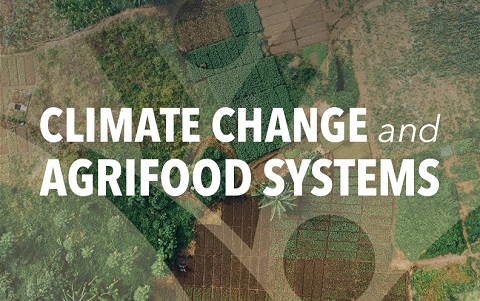This post is part of a series examining key issues involving climate and agrifood systems as the 2023 UN Climate Change Conference (COP28) in Dubai approaches (November 30-December 12). To learn more about IFPRI’s engagement at the Conference, visit our COP28 Spotlight page.
The global food system is particularly vulnerable to the growing disruptions of climate change. Rising temperatures, large-scale shifts in rainfall patterns, and extreme weather events are challenging humanity’s ability to produce, distribute, and access food. Not only does this affect what’s on our plates, but it also has profound implications for public health, livelihoods, and the well-being of vulnerable populations.
We need to act faster to better prepare and transform food systems to deal with the massive challenges of climate change. These efforts must be linked to developing ways to produce more food as the world’s population continues to grow, and many people are still hungry and malnourished. Efforts must also focus on reducing the climate impacts of food systems themselves, which are responsible for a third of the world’s greenhouse gas emissions.
IFPRI’s approach to climate change—outlined in a new report—seeks to address these complex problems in a holistic way.
Mindful that there are no quick fixes, this approach first focuses on anticipating impacts of climate change on food systems, which facilitates planning. With that greater understanding of likely impacts, targeted solutions can then be developed and tested. Cognizant of the fact that many solutions never get implemented or scaled, IFPRI also engages stakeholders on ways to shape enabling environments for climate change solutions to improve their chances for uptake and scaling.
Step 1: Anticipating impacts and facilitating planning
First, policymakers and stakeholders need to understand the scope of the climate and food systems challenge. To provide greater clarity on this front, we utilize a comprehensive suite of data and modeling tools focused on food, land, and water systems of developing countries. IFPRI’s foresight team works with many local partners and modelers across CGIAR, including through the CGIAR Research Initiative on Foresight, providing valuable analysis and, through this work, strengthening the capacity of research and policy institutions in our partner countries.
Our major tool, aptly called IMPACT (International Model for Policy Analysis of Agricultural Commodities and Trade), is a comprehensive system of linked economic, water, crop, and climate models. It supports integrated analysis of changing environmental, biophysical, and socioeconomic trends.
The high-resolution supporting models in the IMPACT network allow us to assess “pixel-by-pixel” impacts of climate change on food production on a subnational level and identify potential climate “hotspots” that might benefit from targeted interventions.
IFPRI also supports the RIAPA (Rural Investment and Policy Analysis) suite of more than 30 detailed country-level economywide models that provide policy analysis to inform decision-making at the national level. RIAPA is useful for predicting effectiveness of policy and investment packages with multiple goals, including economic growth, employment, poverty reduction, empowerment of disadvantaged groups, and nutrition, and for assessing and minimizing trade-offs. These models are also effective for the analysis of large shocks, including extreme weather events, as well as the implications of adaptation options, such as irrigation investments or adoption of climate-smart technologies and practices.
Step 2: Developing and testing solutions
Once the potential impacts and trade-offs are clearer, we can turn to identifying the most suitable and effective solutions—technologies and innovative policies that can help stakeholders adapt to and mitigate climate change and improve food security and nutrition.
Working closely with our partners, we investigate solutions in the following key areas: Achieving adaptation and mitigation through 1) climate-smart technologies and innovations and 2) governance of food, land, and water systems; and building resilience through 3) effective social safety nets and nutrition policies to protect vulnerable populations, 4) risk reduction throughout value chains, and 5) women’s empowerment and resilience.
Step 3: Shaping enabling environments for climate change solutions
Since climate change impacts food systems all over the world, scaling solutions requires working environments that encourage collaboration, innovation, resilience, and flexibility in food and livelihood systems. This is where IFPRI’s work extends to the international, national, and local levels.
At the global level, IFPRI researchers participate in discussions on climate policy, including engaging in global meetings such as the COP climate conferences and informing countries’ negotiations under the United Nations Framework Convention on Climate Change (UNFCCC). We also address the crucial role of international trade policies in ensuring food reaches regions affected by extreme weather events and rising temperatures.
One particularly innovative approach is repurposing domestic support. IFPRI’s research shows that reallocating a portion of the $600 billion per year provided as agricultural support could reduce agricultural emissions significantly.
At the national level, IFPRI also assesses government policies related to agriculture, market development, energy, and water to create an environment conducive to resilience, productivity, and equity. We work closely with communities and natural resource management organizations to promote better governance of natural resources and renewable energy solutions.
Research for real-world solutions that can make a difference
IFPRI’s holistic three-pronged approach to addressing climate change challenges—anticipating impacts, testing innovative solutions, and creating enabling environments—supports policymakers and stakeholders as they tackle one of the most critical challenges of our time. Thus, we ensure that challenges are better understood, solutions are better tailored and more likely to bear fruit, and our food systems are better adapted to climate change—while also contributing to needed mitigation, and will contribute to a sustainable and equitable the future.







